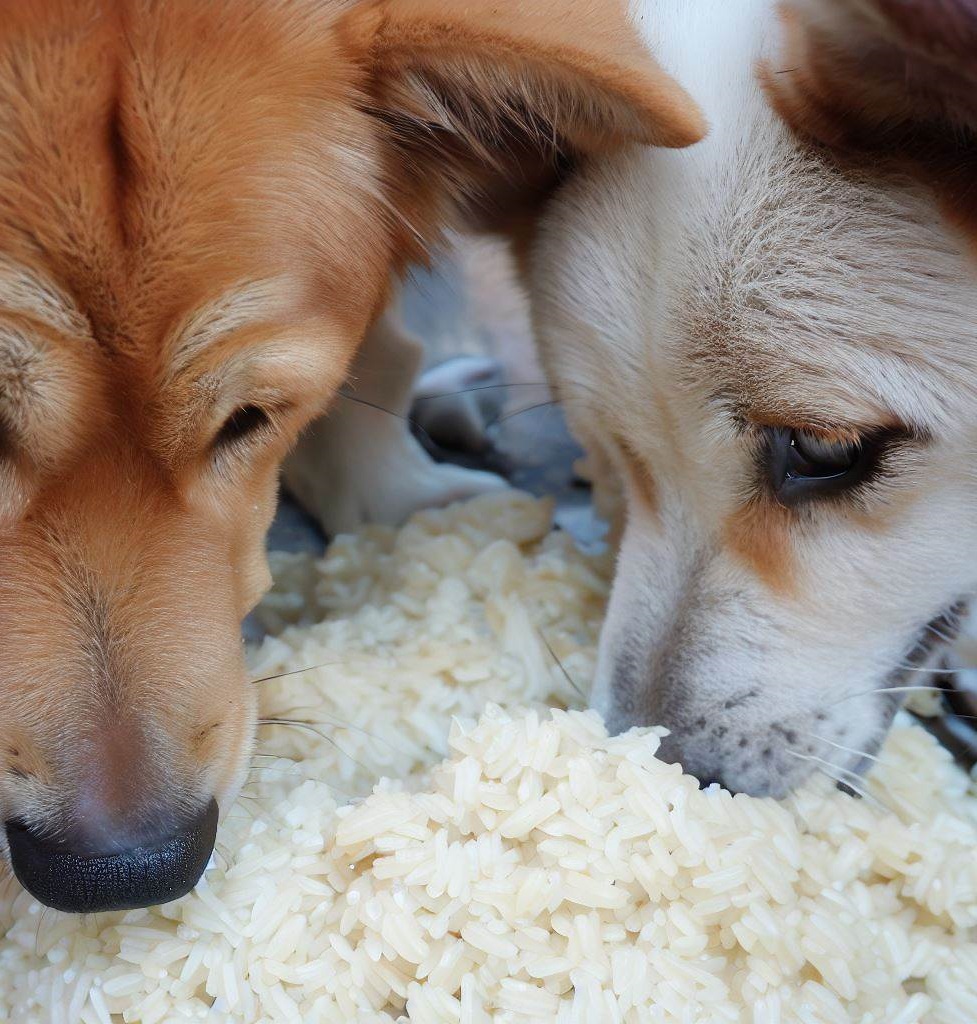Jasmine rice is a type of long-grain rice that is commonly found in Southeast Asia. It is known for its fragrant aroma and fluffy texture, making it a popular choice for many dishes worldwide. However, if you’re a dog owner, you might wonder if it’s safe for your furry friend to eat jasmine rice. In this blog, we’ll explore whether dogs can eat jasmine rice, the nutritional benefits of rice for dogs, and some precautions to keep in mind.
Table of Contents
Is Jasmine Rice Safe for Dogs?
The good news is that jasmine rice is generally safe for dogs to eat. In fact, many commercial dog foods contain rice as an ingredient. Rice is a great source of carbohydrates and is easily digestible for dogs.

However, it’s important to note that not all dogs can tolerate rice, especially if they have digestive issues or food allergies. If your dog has a sensitive stomach or a history of food allergies, it’s best to consult with your veterinarian before adding rice to their diet.
Benefits of Jasmine Rice for Dogs
Jasmine rice can provide several nutritional benefits for dogs, making it a healthy addition to their diet when fed in moderation. Here are some of the benefits of jasmine rice for dogs:
- Good source of carbohydrates: Carbohydrates are an important energy source for dogs, and jasmine rice is a great source of complex carbohydrates. It is easily digestible and can provide sustained energy for your furry friend.
- Low in fat and cholesterol: Jasmine rice is low in fat and cholesterol, making it a good option for dogs that need to watch their weight or have heart health concerns.
- Contains essential vitamins and minerals: Jasmine rice is rich in vitamins and minerals such as thiamin, niacin, and magnesium, which are important for maintaining overall health. These vitamins and minerals can help support your dog’s immune system, promote healthy digestion, and maintain strong bones and teeth.
- Helps with digestion: Rice can be beneficial for dogs with digestive issues, as it is easily digestible and can help soothe an upset stomach. It can also help regulate bowel movements and prevent constipation.
- Gluten-free option: Jasmine rice is a gluten-free option, which can benefit dogs with gluten intolerance or allergies.
It’s important to note that while jasmine rice can provide several nutritional benefits, it should be fed in moderation and should not make up the bulk of your dog’s diet. A balanced diet that includes a variety of proteins, carbohydrates, and fats is essential for maintaining your dog’s overall health and well-being.
How to Safely Feed Jasmine Rice to Dogs? Precautions
Feeding jasmine rice to dogs can be a healthy addition to their diet when done properly. Here are some tips on how to safely feed jasmine rice to dogs:
- Cook the rice thoroughly: Make sure to cook the rice thoroughly before feeding it to your dog. Raw or undercooked rice can contain harmful bacteria that can cause dog digestive issues.
- Avoid adding seasonings or spices: Dogs have a sensitive digestive system, and adding seasonings or spices to their food can cause stomach upset or other health problems. Plain, cooked jasmine rice is the best option for your furry friend.
- Practice portion control: While jasmine rice can be a healthy addition to your dog’s diet, it’s important to practice portion control. Too much rice can lead to weight gain and other health issues. As a general rule of thumb, the rice should make up no more than 10% of your dog’s daily diet.
- Consult with your veterinarian: If your dog has a sensitive stomach or a history of food allergies, it’s best to consult with your veterinarian before adding rice to their diet. They can provide guidance on how much rice is appropriate for your dog’s specific needs and recommend any dietary changes that may be necessary.
- Monitor your dog’s reaction: As with any new food, it’s important to monitor your dog’s reaction to jasmine rice. If your dog experiences any digestive issues, such as vomiting, diarrhea, or constipation, it may be a sign that they are not tolerating the rice well.
When done properly, Jasmine rice can be a healthy addition to your dog’s diet. Cook it thoroughly, avoid adding seasonings, practice portion control, consult with your veterinarian, and monitor your dog’s reaction. With these tips in mind, you can safely incorporate jasmine rice into your furry friend’s diet.
Types of Rice Your Dogs Can Eat
When done properly, rice can be a healthy addition to your dog’s diet. However, not all types of rice are safe or appropriate for dogs. Here are some types of rice that dogs can eat:
- Brown rice: Brown rice is a good source of fiber, vitamins, and minerals, making it a healthy option for dogs. It’s also low in fat and easy to digest.
- White rice: White rice is also safe for dogs and a good carbohydrate source. However, it is less nutritious than brown rice because it has been stripped of its bran and germ.
- Jasmine rice: Jasmine rice is a fragrant long-grain rice that can provide several nutritional benefits for dogs. It is easily digestible and a good source of complex carbohydrates, vitamins, and minerals.
- Basmati rice: Basmati rice is a type of long-grain rice that is also safe for dogs. It is low in fat and high in carbohydrates, making it a good energy source.
- Wild rice: Wild rice is a nutrient-dense whole grain that can provide several health benefits for dogs. It is high in protein, fiber, and antioxidants.
Read More: Can Dogs Eat Mozzarella Cheese?
FAQs
Is jasmine rice safe for dogs to eat?
Yes, jasmine rice is safe for dogs to eat when fed in moderation and cooked thoroughly.
Can dogs digest jasmine rice easily?
Yes, dogs can digest jasmine rice easily as it is a highly digestible source of carbohydrates.
How much jasmine rice can I feed my dog?
As a general rule of thumb, the rice should make up no more than 10% of your dog’s daily diet. The exact amount will depend on your dog’s size, age, and activity level.
Can dogs eat jasmine rice with other ingredients?
Feeding your dog plain, cooked jasmine rice without adding seasonings or spices is best. If you want to mix it with other ingredients, consult with your veterinarian first.
Can dogs with sensitive stomachs eat jasmine rice?
Jasmine rice is a good option for dogs with sensitive stomachs as it is easily digestible and can help soothe an upset stomach.
Can puppies eat jasmine rice?
Yes, puppies can eat jasmine rice as long as it is cooked thoroughly and fed in moderation.
Is jasmine rice better than other types of rice for dogs?
Jasmine rice can provide several nutritional benefits for dogs, but other types of rice, such as brown rice and wild rice, are also good options.
Can dogs with diabetes eat jasmine rice?
While rice can be a source of carbohydrates, it is important to consult with your veterinarian before feeding rice to a dog with diabetes, as their diet needs to be carefully managed.
Can dogs with food allergies eat jasmine rice?
Jasmine rice is a gluten-free option, which can benefit dogs with gluten intolerance or allergies. However, it’s best to consult your veterinarian before making dietary changes.
What are the benefits of feeding jasmine rice to dogs?
Jasmine rice can provide several nutritional benefits for dogs, including being a good source of carbohydrates, low in fat and cholesterol, containing essential vitamins and minerals, helping with digestion, and being a gluten-free option.
Can dogs eat jasmine rice for upset stomach?
Yes, dogs can eat jasmine rice for upset stomachs. Jasmine rice is a highly digestible source of carbohydrates that can help soothe an upset stomach in dogs. It is also low in fiber, which can be beneficial for dogs with digestive issues.
Can dogs eat jasmine rice for diarrhea?
Yes, dogs can eat jasmine rice for diarrhea. Jasmine rice is a good source of easily digestible carbohydrates and can help to bind loose stools.
Conclusion
In conclusion, jasmine rice is generally safe for dogs and can provide several nutritional benefits. However, it’s important to remember that not all dogs can tolerate rice, especially those with digestive issues or food allergies.
If you’re unsure whether your dog can eat rice, it’s best to consult with your veterinarian. Additionally, cook the rice thoroughly, avoid adding any seasonings or spices, and practice portion control to keep your furry friend healthy and happy.






